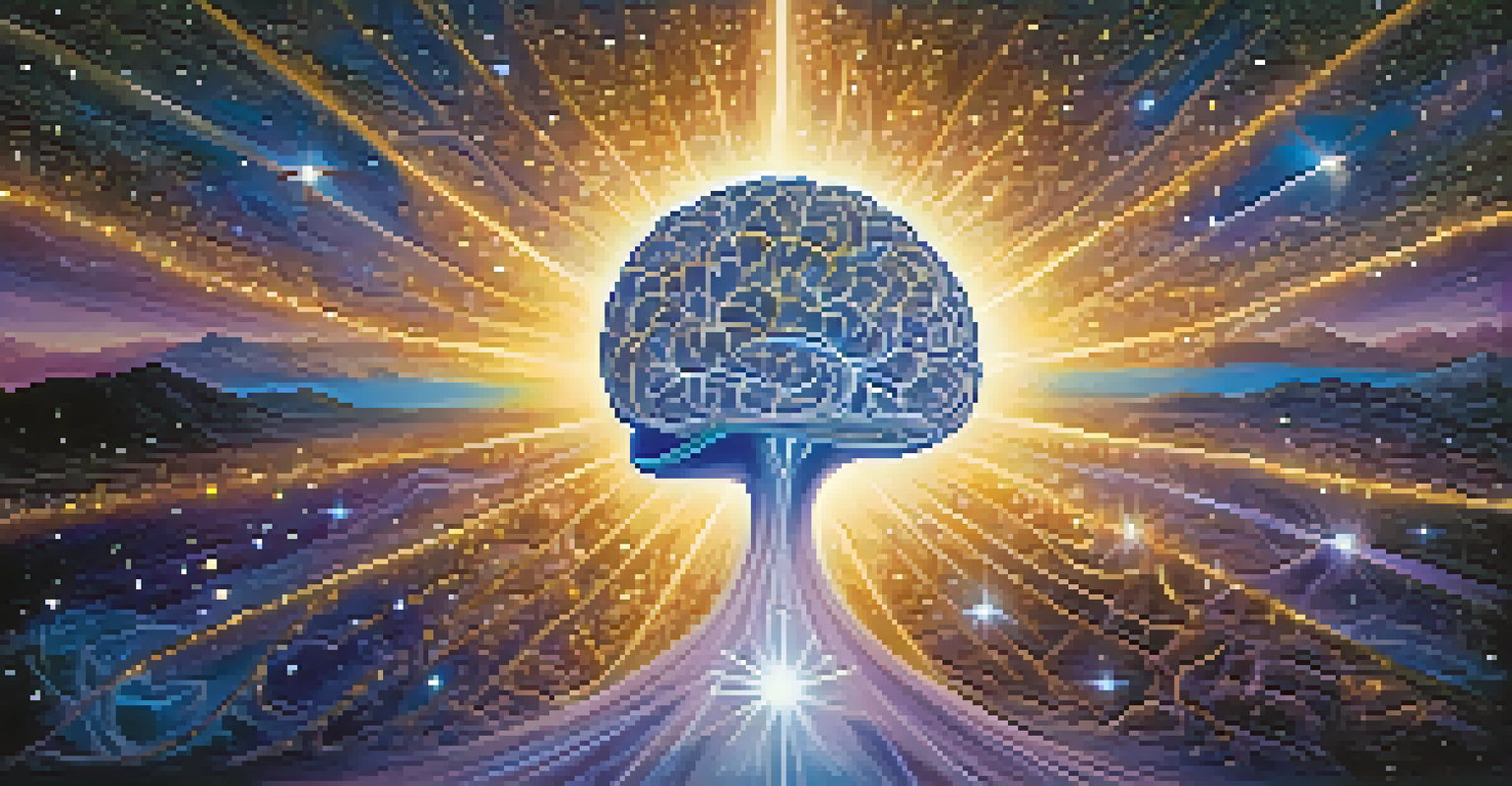The Interplay Between Spirituality and Scientific Understanding

Understanding Spirituality: A Personal Journey
Spirituality often refers to the search for meaning and connection within ourselves and the universe. Unlike organized religion, which has structured doctrines, spirituality is more personal and can take many forms. For some, it involves meditation or mindfulness practices, while others may find it in nature or through creative expression. This journey is deeply individual, allowing each person to explore their beliefs and experiences in a way that resonates with them.
Science without religion is lame, religion without science is blind.
As we navigate through life, we may encounter moments that spark our spiritual curiosity, such as witnessing a breathtaking sunset or feeling a profound sense of peace during a quiet moment. These experiences can lead us to question the nature of existence and our role in the larger scheme of things. This quest for understanding is often where spirituality begins, prompting us to seek answers both internally and externally.
In this context, spirituality becomes a bridge that connects us to our deeper selves and the world around us. It encourages introspection and fosters a sense of belonging, which can be incredibly grounding. By embracing our spirituality, we can cultivate a greater appreciation for life's mysteries, ultimately enriching our human experience.
Science: The Quest for Objective Truth
At its core, science is about exploring and understanding the world through observation, experimentation, and evidence. Scientists use rigorous methodologies to test hypotheses, aiming to uncover the underlying mechanisms of nature. This objective approach allows us to make sense of phenomena, from the smallest particles to the vastness of the cosmos, providing clarity in an often chaotic world.

The scientific method relies on repeatability and peer review, ensuring that findings are scrutinized and validated before being accepted as truth. This process has led to remarkable advancements in technology, medicine, and our understanding of the universe. However, science is not just about cold hard facts; it can also evoke feelings of wonder and curiosity that resonate with our spiritual selves.
Integration Enhances Emotional Well-being
Combining spiritual practices with scientific insights can significantly improve emotional well-being, promoting mindfulness and resilience.
While science seeks to explain the 'how' of the universe, it often leaves the 'why' questions unanswered. This gap can lead to a sense of mystery that invites spiritual contemplation. By appreciating both the scientific method and the mysteries of existence, we can create a more holistic understanding of life that encompasses both intellect and intuition.
Finding Common Ground: Spirituality Meets Science
The intersection of spirituality and science provides fertile ground for exploration and dialogue. While they may seem at odds, both share a deep curiosity about existence and our place in it. Many scientists express a sense of awe when contemplating the universe, akin to spiritual experiences, suggesting that both realms can inform and enrich one another.
The more I study science, the more I believe in God.
For instance, quantum physics challenges our traditional notions of reality, introducing concepts that echo spiritual ideas about interconnectedness and consciousness. This emerging field invites us to reconsider the boundaries of what we know and opens the door to new interpretations of existence. Such insights can lead to a more comprehensive understanding of both the physical world and our inner lives.
By recognizing the value in both approaches, we can foster a dialogue that encourages us to explore life's big questions from multiple perspectives. This collaborative exploration can deepen our appreciation for the complexities of existence, encouraging us to remain open-minded as we seek to understand the interplay between spirituality and science.
The Role of Consciousness in Spirituality and Science
Consciousness is a fascinating topic that sits at the heart of both spiritual and scientific discussions. From a spiritual perspective, consciousness is often seen as the essence of our being, the part of us that connects to something greater. Many spiritual practices, like meditation, aim to enhance our awareness and understanding of this consciousness, allowing us to tap into deeper insights.
On the scientific front, consciousness remains one of the most enigmatic subjects. Researchers are investigating how consciousness arises from brain activity and what it means for our understanding of reality. Despite advancements in neuroscience, many questions remain unanswered, prompting a sense of wonder similar to that found in spiritual exploration.
Spirituality Is a Personal Journey
Spirituality allows individuals to explore their beliefs and experiences in a deeply personal way, fostering introspection and connection.
This shared intrigue about consciousness bridges the gap between spirituality and science. Both realms encourage us to investigate the nature of our awareness and its implications for our lives. By delving deeper into this connection, we not only enhance our understanding of ourselves but also of the universe we inhabit.
Emotional Well-being: The Benefits of Integration
Integrating spirituality and scientific understanding can significantly enhance our emotional well-being. Engaging in spiritual practices can promote mindfulness, reduce stress, and foster a greater sense of purpose. On the other hand, scientific insights into mental health can provide practical tools and techniques to support our emotional journeys, creating a more comprehensive approach to well-being.
For example, studies show that mindfulness meditation, a spiritual practice, can lead to measurable improvements in brain function and emotional regulation. When we combine these insights with scientific findings on the benefits of gratitude and compassion, we cultivate a richer emotional landscape that nurtures resilience and happiness. This synergy can empower individuals to lead more fulfilling lives.
Moreover, by acknowledging the interplay between these two domains, we can develop holistic strategies for coping with life's challenges. This integrated approach encourages us to draw on both our inner wisdom and scientific knowledge, resulting in a more balanced and fulfilling emotional experience. Ultimately, the fusion of spirituality and science can pave the way for a deeper understanding of ourselves and the world around us.
The Influence of Culture on Spirituality and Science
Culture plays a significant role in shaping our perceptions of both spirituality and science. Different cultures have unique spiritual traditions and beliefs that influence how individuals engage with the world. These frameworks can affect everything from our understanding of existence to our approach to scientific inquiry, creating a rich tapestry of perspectives.
For instance, indigenous cultures often integrate spirituality into their understanding of nature, viewing the environment as a living entity deserving of respect. This perspective contrasts with more industrialized views that may prioritize scientific progress over environmental stewardship. By examining these cultural differences, we can gain insights into how spirituality and science can coexist and inform one another.
Science Explores Objective Truth
Science employs observation and experimentation to uncover the mechanisms of nature, providing clarity while evoking wonder about existence.
Recognizing the influence of culture encourages us to appreciate diverse viewpoints and fosters a more inclusive dialogue. By learning from one another, we can discover innovative ways to bridge the gap between spirituality and science, creating a more holistic understanding that respects both individual beliefs and collective knowledge.
The Future of Spirituality and Science: A Collaborative Path
As we look to the future, the interplay between spirituality and science holds great promise for enriching our understanding of life. This evolving relationship encourages collaboration rather than competition, inviting individuals from both realms to engage in meaningful dialogue. By working together, we can explore the mysteries of existence and uncover new insights that benefit humanity as a whole.
Emerging fields such as neurotheology, which studies the relationship between brain activity and spiritual experiences, exemplify this collaborative spirit. By combining scientific rigor with spiritual exploration, researchers can shed light on how these two domains intersect, potentially unlocking new pathways for understanding consciousness and well-being. This integration paves the way for innovative approaches that embrace complexity and foster growth.

Ultimately, the future of spirituality and science depends on our willingness to remain open to new ideas and perspectives. By embracing the best of both worlds, we can cultivate a deeper understanding of ourselves, the universe, and the intricate dance between the two. This collaborative path not only enriches our own lives but also contributes to the collective wisdom of humanity.